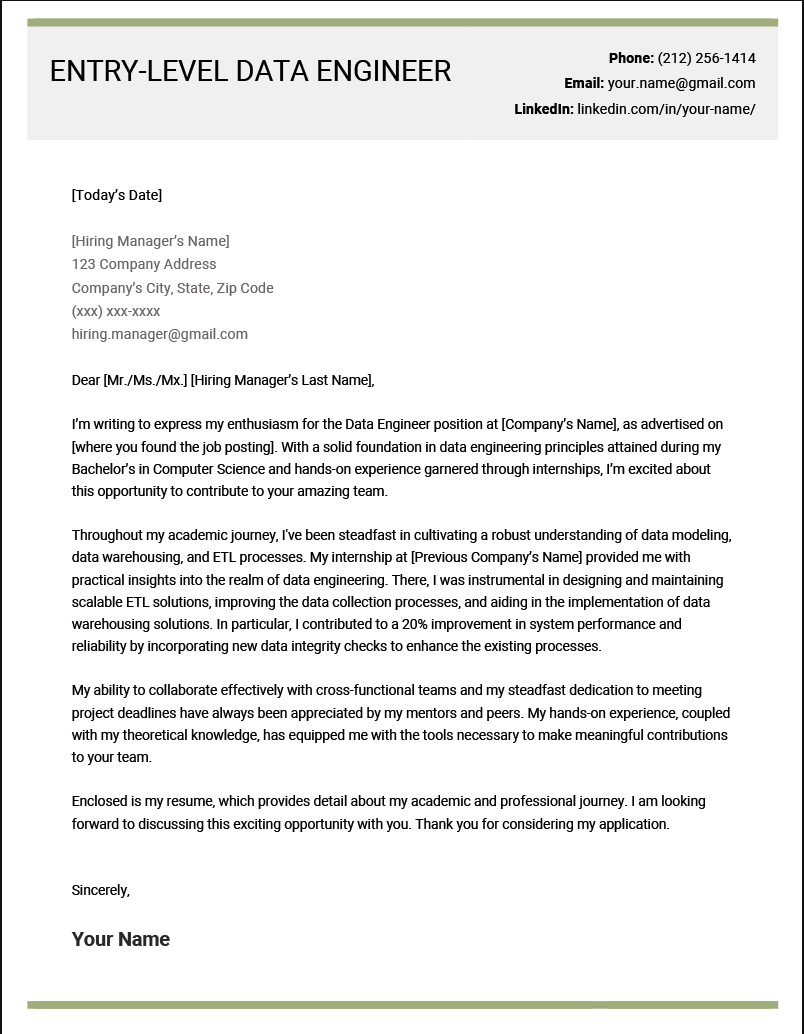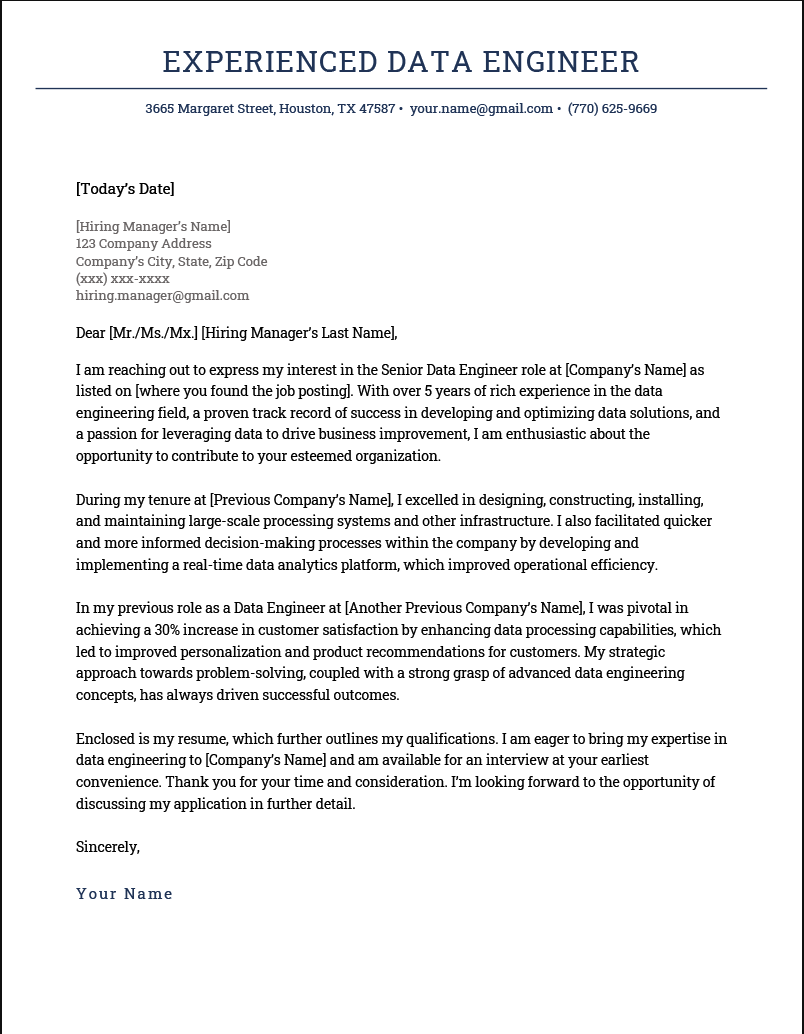As a data engineer, you’ll support companies in gathering and storing information and making it accessible to data scientists and analysts. Depending on your specialization, you could design and manage databases, create data pipelines, and collaborate with data scientists on analytical projects.
Data engineers are crucial for allowing companies to analyze large amounts of data, and their work enables businesses to predict trends and reach their goals. Career opportunities for data engineers are projected to grow by 8% by 2032, demonstrating how much employers value their work.
Whether you’re about to start your career as a data engineer or have some experience under your belt, a compelling cover letter can help you land your ideal role. Below, we’ll explain how to write an effective cover letter for a data engineer job.
Cover Letter Basics
Before getting started on your data engineer cover letter, it’s essential to understand the importance of a good cover letter when applying for a role. Let’s explore the critical components and how potential employers use them to assess your suitability.
Purpose of a cover letter
Crafting a cover letter to accompany your application is essential; in fact, many employers don’t consider applications without one. But whether or not it’s required, your cover letter lets you expand on highlights from your resume and explain how they link to the role you’re applying for. Unlike your resume, you can use your cover letter to outline why you want to work for a specific company and what attributes make you an ideal candidate.
Key components
Tailoring your cover letter to suit each employer is the best way to show how you fit the organization’s needs. However, all strong cover letters contain the following key elements:
- Contact information
- Greeting
- Opening explaining why you want the job and how you found the listing
- Body text outlining your most relevant skills and experience
- Closing with a call to action (CTA) asking the hiring manager to schedule an interview
Step-by-Step Guide to Writing a Data Engineer Cover Letter
To make things easier for you, we’ll break down the cover letter writing process below:
Research and preparation
Before you begin writing, research the company you’re applying to to understand its projects, values, and work environment. The job description often provides some basic details, but it’s worth visiting the company’s website to get a fuller picture.
In addition to reviews, you should explore the company’s “about me” page to learn about their mission, values, and work culture. The recruitment page may also provide information on the company’s ideal hire.
If you want to give your application an edge, consider:
- Following the company on social media to learn more about its activities and culture
- Checking news outlets for details of the company’s latest projects and achievements
- Discussing the skills and values that matter to the company if you know someone who works there
- Searching for the company’s profile on networking websites, such as LinkedIn
During your research, look for areas where your skills and experience align with the company’s projects and values. Referencing company-specific information in your cover letter shows you understand its business needs and took the initiative to learn about its culture.
Structuring the cover letter
A well-structured cover letter is easier to read and allows the hiring manager to quickly locate the information they need. Here’s how to structure your data engineer cover letter for maximum impact:
Contact information
Place your contact information in the top right corner of your cover letter. At a minimum, include your email address and phone number so the hiring manager can get in touch to arrange an interview.
Greeting
Start your cover letter by greeting the hiring manager. If you know their name and gender, write “Dear Mr./Ms. [Surname]”. Address them by their first and last name if you’re unsure of their gender. You can usually find the hiring manager’s name on the job listing. Use “Dear Hiring Manager” if the listing doesn’t mention them by name.
In the past, candidates generally used the salutations “Dear Sir or Madam” or “To whom it may concern.” However, these phrases are outdated and may make your cover letter sound overly stiff.
Next, introduce yourself with a short paragraph explaining who you are and why you want to apply for the job. Mention where you found the job listing. Link your reasons for applying with your research on the company to align your introduction with its mission. For example:
Dear Mr. Ahmed,
I was excited to find your job posting for the role of Junior Data Engineer on Glassdoor. As a recent graduate with internship experience translating complex data into straightforward formats, I feel confident that I can help [Company] achieve its mission of improving access to crucial health information.
Body Text
Your body text should explain how you meet the role specification in the job description. However, that doesn’t mean you should rehash every point on your resume. Instead, keep your text concise by focusing on the employer’s must-haves.
Determine which skills the company needs most by checking the job advertisement, emphasizing any points mentioned more than once.
If possible, use keywords and phrases from the job description. Companies often use software to pre-screen applications, and borrowing language from the job ad ensures your cover letter screens for the most important skills.
Connect your skills and experience to the company’s mission and values when possible. Including a bulleted list of your most impressive skills and achievements breaks up the text and makes your letter more readable.
Here’s an example of a compelling body text section from a junior data practitioner cover letter:
I can see from your job posting that you need a data practitioner who can work collaboratively to find new data sources. During my employment at [Y Company], I regularly worked with other departments to identify and acquire crucial information and convert it into usable formats. My work directly supported the analytics department in improving its efficiency by 37% in 2022.
My other key achievements include:
- Debugging data pipelines for time-sensitive projects, reducing operational delays by 21% over six months
- Collaborating with a team of three engineers to streamline data input processes
- Designing a recurring process for the marketing department to automate part of its workflow, increasing departmental productivity by 13% in 2021
Closing
Your final paragraph should summarize why you’re ideal for the position using key skills from the job description. Include a call to action (CTA) asking the hiring manager to contact you for an interview and thank them for their consideration. Conclude your letter with a professional sign-off, such as “Sincerely, [Your Name].”
This example comes from an entry-level data engineer cover letter. It clearly explains why the hiring manager should invite the candidate to an interview and includes a CTA:
I am confident that my strong data analysis skills and knowledge of database systems will allow me to support [Company] in continuing its success as a leading healthcare provider. I look forward to discussing my skills and experience with you and am available for an interview at your convenience. Many thanks for considering my application.
Sincerely,
[Your Name]
Highlighting Skills and Experiences
When highlighting your relevant skills in the body text, make your cover letter more effective by including metrics. For example, you could explain how your work impacted the company’s operations by describing improvements in efficiency, accessibility, or productivity. Wherever possible, use hard data to make your points even more compelling.
You should also illustrate your skills using real-life examples from your work or education history. Including tangible examples allows the hiring manager to assess how your skills and experience can benefit their team.
Data Engineer Cover Letter Examples and Templates
One of the best ways to write a successful cover letter is to use samples from your sector to get inspiration for how to best present your achievements. Use the examples and templates below to help you get started:
Example 1: Entry-level data engineer
As an entry-level applicant, you’ll need to pull examples from your education and related experiences (such as internships) to show hiring managers you’re ready to take on the daily responsibilities of the role.
In the example above, an entry-level candidate uses lots of examples to showcase skills that are relevant to the position and convince the hiring manager that they’ll have a positive impact if hired:
[Today’s Date]
[Your Name]
[Your Email]
[Your Phone Number]
[Hiring Manager’s Name]
[Company’s Name]
[Company’s Address]
[City, State, Zip]
Dear [Hiring Manager’s Name],
I’m writing to express my enthusiasm for the Data Engineer position at [Company’s Name], as advertised on [where you found the job posting]. With a solid foundation in data engineering principles attained during my Bachelor’s in Computer Science and hands-on experience garnered through internships, I’m excited about this opportunity to contribute to your amazing team.
Throughout my academic journey, I've been steadfast in cultivating a robust understanding of data modeling, data warehousing, and ETL processes. My internship at [Previous Company’s Name] provided me with practical insights into the realm of data engineering. There, I was instrumental in designing and maintaining scalable ETL solutions, improving the data collection processes, and aiding in the implementation of data warehousing solutions. In particular, I contributed to a 20% improvement in system performance and reliability by incorporating new data integrity checks to enhance the existing processes.
My ability to collaborate effectively with cross-functional teams and my steadfast dedication to meeting project deadlines have always been appreciated by my mentors and peers. My hands-on experience, coupled with my theoretical knowledge, has equipped me with the tools necessary to make meaningful contributions to your team.
Enclosed is my resume, which provides detail about my academic and professional journey. I am looking forward to discussing this exciting opportunity with you. Thank you for considering my application.
Sincerely,
[Your Name]
Example 2: Experienced Data Engineer
The above cover letter, written by a more experienced applicant, shows how to incorporate accomplishments from past work experience into your cover letter:
[Today’s Date]
[Your Name]
[Your Email]
[Your Phone Number]
[Hiring Manager’s Name]
[Company’s Name]
[Company’s Address]
[City, State, Zip]
Dear [Hiring Manager’s Name],
I am reaching out to express my interest in the Senior Data Engineer role at [Company’s Name] as listed on [where you found the job posting]. With over 5 years of experience in the data engineering field, a proven track record of success in developing and optimizing data solutions, and a passion for leveraging data to drive business improvement, I am enthusiastic about the opportunity to contribute to your esteemed organization.
During my tenure at [Previous Company’s Name], I excelled in designing, constructing, installing, and maintaining large-scale processing systems and other infrastructure. I also facilitated quicker and more informed decision-making processes within the company by developing and implementing a real-time data analytics platform, which improved operational efficiency.
In my previous role as a Data Engineer at [Another Previous Company’s Name], I was pivotal in achieving a 30% increase in customer satisfaction by enhancing data processing capabilities, which led to improved personalization and product recommendations for customers. My strategic approach to problem-solving, coupled with a strong grasp of advanced data engineering concepts, has always driven successful outcomes.
Enclosed is my resume, which further outlines my qualifications. I am eager to bring my expertise in data engineering to [Company’s Name] and am available for an interview at your earliest convenience. Thank you for your time and consideration. I’m looking forward to discussing my application in further detail.
Sincerely,
[Your Name]
Customizable template
To make sure your cover letter is well-organized and correctly formatted, it’s a great idea to use a professional cover letter template. For a data engineering role, try a simple design like the Milano cover letter template, which is free to download and includes several color variations.
This template includes additional guidance for framing your cover letter and customizing the content to your individual experiences to make the best first impression.
Common Mistakes and How to Avoid Them
A few rookie errors could make your cover letter less appealing to a hiring manager. Here are the most common mistakes people make while writing data engineer cover letters — and how to avoid them.
Generic statements
Generic statements, such as expressing your passion for being a data engineer, can make your cover letter sound impersonal. While these statements may be true, they don’t tell the hiring manager anything unique about your skills or achievements or set you apart from other applicants. Furthermore, they take up space you could be using to emphasize your key selling points.
You can personalize your cover letter by:
- Greeting the hiring manager by name
- Explaining why you want the job, linking the company’s values or goals to your skills
- Reflecting skills mentioned in the job advert in your body text
Lengthy narratives
Your cover letter should never exceed a full page. A hiring manager wants to gain a quick overview of your suitability for the job without reading through pages of narrative. Keep your points brief and focus on your most relevant skills to create impact. The hiring manager can always ask follow-up questions in an interview to learn more about you.
Neglecting company research
Researching a company demonstrates your commitment and increases your chance of getting an interview. While research can be time-consuming, it’s an excellent opportunity to tailor your letter to each employer’s unique requirements. Otherwise, you risk your letter reading as non-committal and generic.
Doing your homework on each employer will also pay dividends on interview day. Understanding the company’s priorities allows you to answer job-specific questions and show how you fit into its culture.
Final Thoughts and Additional Resources
Personalizing your cover letter to suit each employer, focusing on your most relevant skills, and demonstrating knowledge of the company’s culture make your data engineer cover letter stand out among a sea of applicants.
To make a great first impression, use a professional cover letter template with a slick format. It’s also a good idea to create a matching resume to make your application look cohesive.
Want to increase your chances of getting that all-important interview? Consider updating your knowledge with our data engineering courses, learn how to answer common data engineer interview questions and get certified as a data engineer.
As a certified professional resume writer (CPRW) and career coach, I’m passionate about empowering individuals and driving positive change in what I do. I help people find fulfilling jobs at Resume Genius and work on new copy at UserBit.



